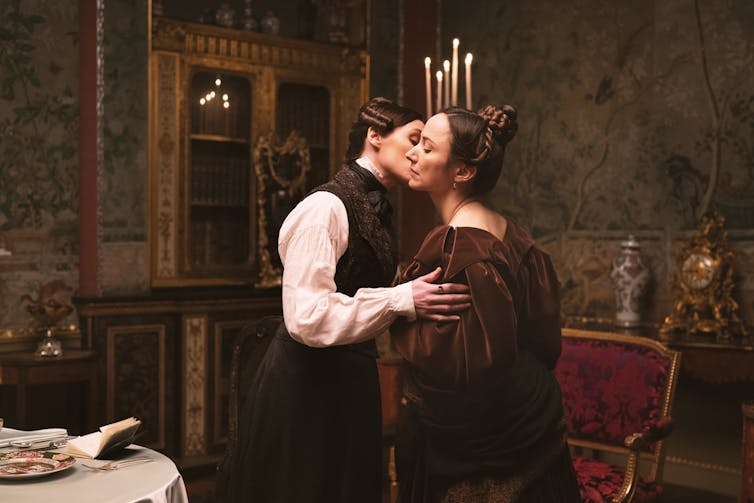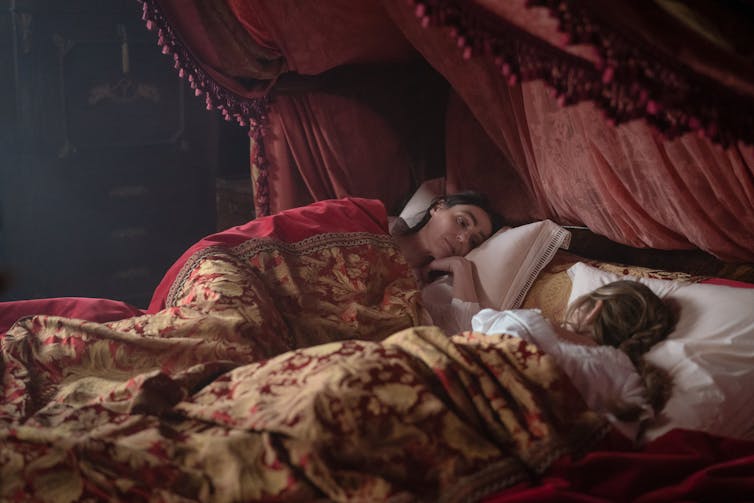
Based on the writings of English diarist Anne Lister(1791-1840), Sally Wainwright’s immensely popular BBC television series Gentleman Jack has returned for a second season. In comparison to the first, the new episodes rely more heavily on the language of the diaries.
Lister lived at a time when women were not supposed to talk about sex at all. Nevertheless, in her diaries, she recorded her own sex life in explicit detail. This sometimes meant having to come up with her own words for what she wanted to say. At other times, she turned to slang used in her narrow circle of female friends and lovers to avoid being understood by outsiders.
Here are five 19th-century lesbian words and phrases from Lister’s diaries that you need to know to get as much as possible out of series two of Gentleman Jack.
1. Jack
The most obvious lesbian-related word in Gentleman Jack is the “jack” of the title. This was a 19th-century slang term for lesbian. But Lister herself used the word in the slightly more specific sense of masculine-presenting lesbians, which is reflected in the second series of the show.
In episode two, Lister’s old friend and sometime lover Isabella “Tib” Norcliffe says that it was probably just as well that Mariana Lawton, the daughter of a local doctor, “stole” Lister from her since “after all, two jacks don’t suit”. This line comes from Lister’s diary, where the possibility of a long-term relationship between the two of them, who are both butch, is dismissed (September 12 1825).
In her relationships with Lawton and also the heiress Ann Walker, Lister always referred to her partner as the wife and to herself as the husband. She never seems to have reflected on the feminine-presenting women she pursued as either heterosexual or homosexual. For her, her masculinity meant that they, as women, could be attracted to her.
2. Kiss
This one may seem obvious, but Lister used the word “kiss” in a very particular way. Viewers of Gentleman Jack may have been confused when Lister mentions having had “three very good kisses last night” or that Ann Walker “in a quarter of an hour had a pretty good kiss”.
“Kiss” is Lister’s main word for sex. Specifically, it usually refers to orgasm. Lister often starts her diary entries by stating whether she has had a kiss the night before and rating it, ranging from “tolerable” to “excellent”.
In Gentleman Jack, Lawton initiates sex with her ex by saying, “Can we not have one last kiss in this life before we turn to dust?” Even though the immediate effect is actual kissing, the pair soon move on to having what seems to be exactly the sort of sex that is typically described as a kiss in the diaries – that is, tribbing (what might now be crudely called “scissoring”) leading to mutual orgasm.

3. Connected
Another phrase that Lister uses when referring to sex is “to be connected”. Unlike “kiss”, the word “connected” does not imply pleasure but is more neutral. It’s also more likely to be used about other people’s sex, especially sex with men.
The word “connected”, or the variation “connection”, is used several times in series two. In episode four, Lawton asks Lister, “How often are you and Miss Walker connected?” She goes on to remind Lister that she asked Lawton the same thing about her and her husband, an event which Lister recorded in her diary (November 18 1819) and which was portrayed in the 2010 television drama The Secret Diaries of Miss Anne Lister, which focused on the earlier parts of the relationship with Lawton.
4. Incur a cross
In addition to writing parts of her diaries in code (or her “crypthand”, as she called it), Lister also had a number of symbols that she put in the margin of the page to indicate, for example, a sexual experience or the onset of her or her partner’s “cousin” (her word for “period”).
The habit of drawing an “x” in the margin of her diary when she masturbated led to her euphemism “to incur a cross”. She writes, for example, “Incurred a cross just before getting up thinking of Miss W- and π [Lawton] but at the very moment of π” (March 17 1833).
5. Grubble
“Grubble”, an old word for “grope”, was Lister’s term for fingering a partner. Unlike “kiss”, the word “grubble” does not imply orgasm, though nor does it preclude it.
Grubbling can be done over or under clothes or, more often than not, involve the “right middle finger up her queer [Lister’s word for vulva or, here, vagina]” (October 11 1832). (Viewers may remember how, whenever Lister holds a glass in her hand in the show, she suggestively strokes it with her right middle finger.)
Gentleman Jack is historically correct in portraying Lister as invariably the giver rather than the receiver of grubbles. She frames grubbling as being on the whole inferior to “kisses” that one gets from “being near” one’s partner, which she explains as genital skin-to-skin contact.

To return to the on-screen “kiss” between Lister and Lawton, it’s interesting that Lister doesn’t describe this as a kiss in her diary. According to Lister, she “gave [Lawton] a thorough grubbling”. When she feels guilty afterwards, she justifies her actions to herself by saying that she had “somehow” thought it a good idea at the time to “gratify [Lawton’s] passion by one parting grubble” (December 25 1834).
The depiction of this encounter as a “kiss” in Gentleman Jack made one die-hard fan of the diaries exclaim on a forum that it wasn’t a kiss but “actually just a fully clothed grubble”.
Mette Hildeman Sjölin does not work for, consult, own shares in or receive funding from any company or organization that would benefit from this article, and has disclosed no relevant affiliations beyond their academic appointment.
This article was originally published on The Conversation. Read the original article.







